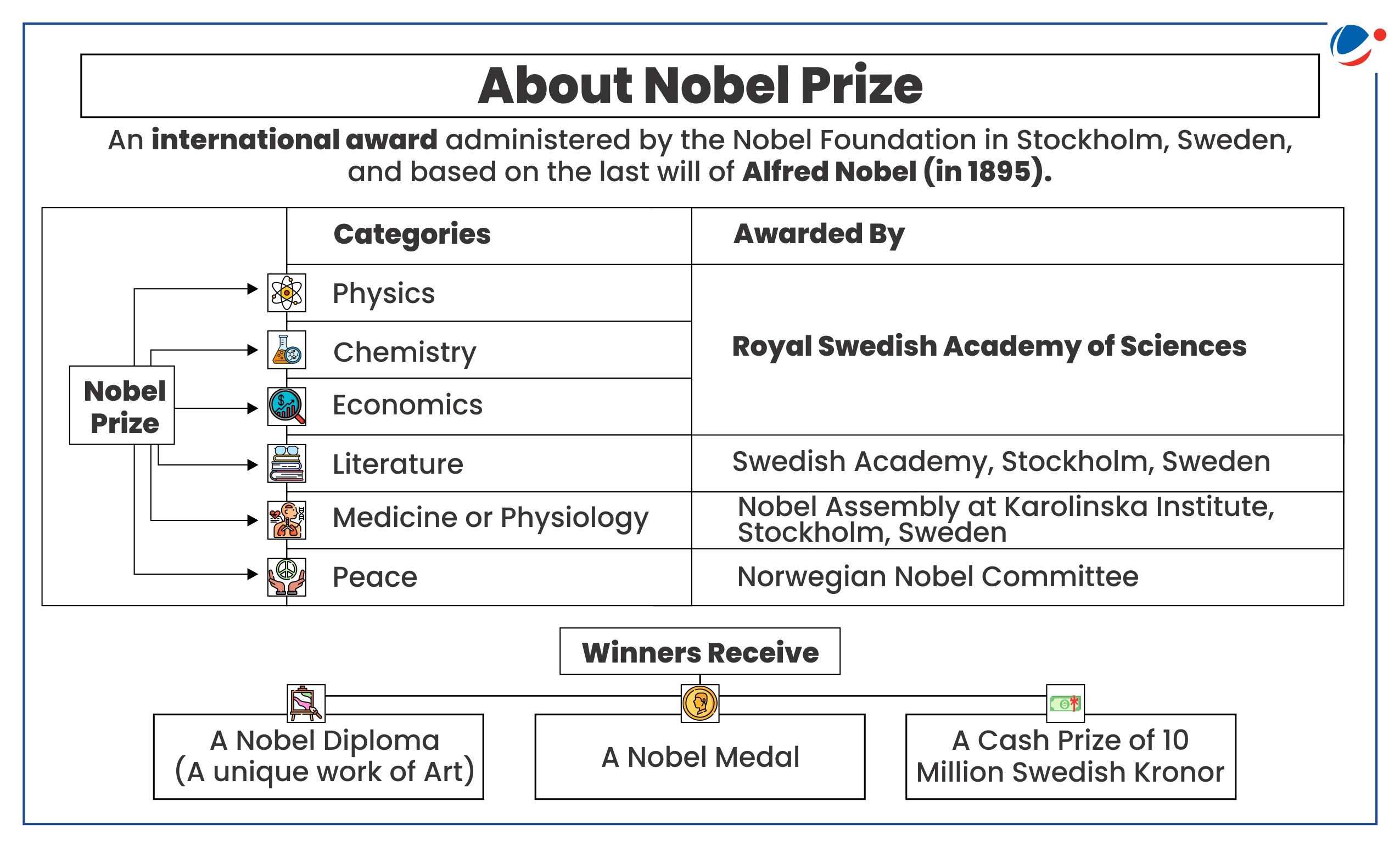Why in the news?
The 2024 Nobel Prize in Economics was awarded to Daron Acemoglu, Simon Johnson and James A. Robinson for their research on "how institutions are formed and their impact on prosperity".
More on news
- The research demonstrated the importance of societal institutions for a country's prosperity.
- Research also highlighted that democracy developed in various colonies as the threat of revolution by the masses could not be tackled through the promise of social reforms.

Key Highlights of their research
- Colonial Impact on Prosperity: Colonizers established systems from the 16th century that caused a "reversal of fortunes" - the poorest became the richest.
- Factors influencing the type of institutions: Settler mortality rates, which were higher in disease-prone areas near the equator, and population density influenced the types of institutions established during colonization.
- Types of Institutions:
- Extractive Institutions: Formed in some colonies to exploit the indigenous population and extract natural resources to benefit the colonisers.
- In such environments, individuals face significant risks of confiscation, leading to a lack of motivation for long-term investment.
- Inclusive Institutions: Colonisers built inclusive political and economic systems for the long-term benefit of European Settlers in colonies that were sparsely populated and supported more European settlers.
- These institutions offered individuals a strong incentive to work, save and invest in the long run.
- Extractive Institutions: Formed in some colonies to exploit the indigenous population and extract natural resources to benefit the colonisers.
- E.g, The divided city of Nogales highlights differences created by the type of institution.
- On the north side (USA), residents have better economic conditions, secure property rights, and political freedoms.
- In contrast, the south side (Mexico) struggles with organized crime and corruption.
- The main difference lies in their institutional frameworks, showing how colonial legacies affect present-day living conditions.
- Institutional Traps: The researchers explain that some societies are trapped in extractive institutions, limiting progress.
- However, they emphasize that change is possible; reforms can lead to democracy and the rule of law, reducing poverty.
Role of Economic and Political Institutions in Shaping National Prosperity
- Resource Allocation and Property Rights: Economic institutions dictate resource allocation and protection.
- E.g. Article 300A (Right to Property) ensures that no person shall be deprived of their property except by authority of law.
- Niti Aayog: It is the premier policy think tank of the Government.
- Incentives for Investment: Inclusive institutions foster competition and entrepreneurship, promoting development.
- E.g. The National Innovation Foundation (NIF) promotes grassroots innovation.
- Sustainability: Effective institutions ensure sustainable resource management. Poor institutions can lead to over-extraction, harming the environment and future growth.
- E.g., Article 48A (Directive Principles of State Policy) provides for the protection and improvement of the environment and the safeguarding of forests and wildlife
- E.g., the National Green Tribunal a specialised judicial body equipped for the purpose of adjudicating environmental cases
- Regulations: Good regulation promotes competition and innovation.
- E.g., Competition Commission of India (CCI) promotes fair competition and prevents monopolies and anti-competitive practices.
- Governance and Rule of Law: Political institutions ensure stable governance and the rule of law, reducing corruption and fostering a fair environment for investment.
- E.g., Article 14 provides equality before the law.
- E.g., The Central Vigilance Commission (CVC) for promoting integrity, transparency, and accountability in the country's public administration.
- Inclusiveness: Democratic institutions promote participation in decision-making, leading to policies that meet the population's needs.
- E.g., Tribal Advisory Council (TAC) for the welfare and advancement of Scheduled tribes in states.
- Conflict Resolution: Effective institutions that provide conflict resolution mechanisms promote political stability, attract investment, and support economic growth.
- E.g., National Legal Services Authority (NALSA), along with other legal Services Institutions , organizes Lok Adalats to resolve disputes efficiently and reduce legal bottlenecks
Steps Taken by India to Build Strong Economic Institutions | Steps Taken by India to Build Strong Political Institutions |
|
|
Conclusion
The relationship between economic and political institutions is key to national prosperity. Strong economic institutions that protect property rights and encourage investment, combined with effective political institutions that ensure good governance and inclusiveness, foster growth.
About The Sveriges Riksbank Prize in Economic Sciences commonly known as Nobel Prize of economics
|






